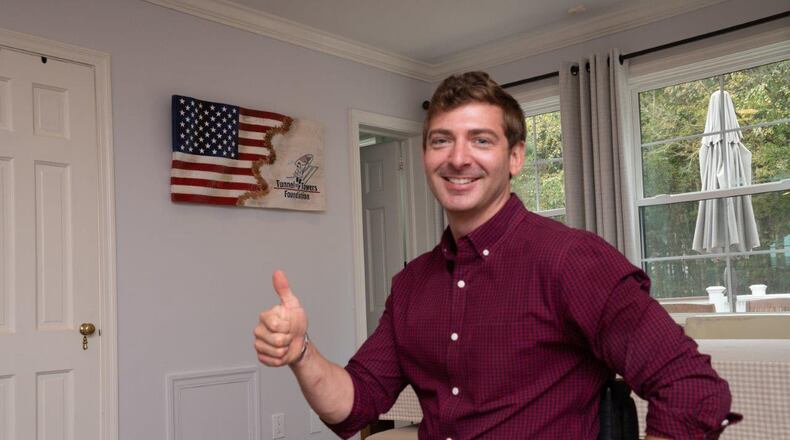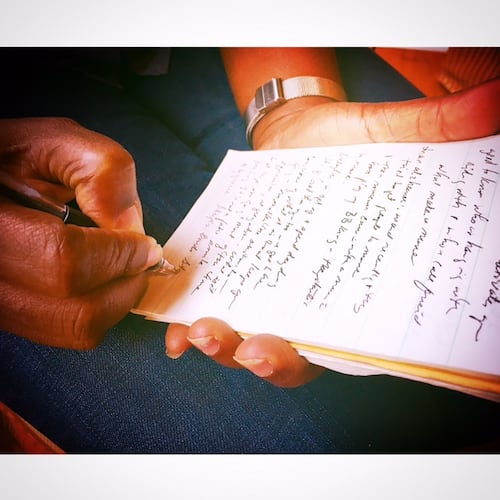Dan Berschinski will spend Thanksgiving Day with his girlfriend and her parents in Onancock, an inviting little town on the eastern shore of Virginia.
It’ll be a small gathering thanks in no small part to the coronavirus pandemic, but it’ll feel good to celebrate the season just the same.
Especially this year.
This year, the 36-year-old retired Army captain will mark the day unburdened by debt or worrying about how to maneuver the halls and doorway of his home.
When he purchased his Buckhead home in 2017, Berschinski knew he needed to make repairs just to be able to enter and exit his residence in his wheelchair.
He hired a handyman to build a ramp from the driveway up to the back deck but still couldn’t access his home from the front door. There were also some narrow doorways and closets he couldn’t get into, but he’d just have to make do — at least until he could afford to make renovations.
In 2018, he was waiting to get fitted for new prosthetic legs at Walter Reed National Military Medical Center when a fellow wounded veteran told him his mortgage had been paid off by Tunnel to Towers, a nonprofit that honors the sacrifice of FDNY Firefighter Stephen Siller, who laid down his life to save others on Sept. 11, 2001.
Berschinski couldn’t believe his ears.
He logged on to the nonprofit’s website, filled out the application and clicked the submit button.
In a telephone call a few days later, he learned that not only would Tunnel to Towers pay off his $400,000 mortgage, it would make his home completely wheelchair-accessible.
Like I said, Berschinski couldn’t believe his ears.
People who enter the military don’t sign up to serve their country hoping their country will do something for them in return one day. They sign up because they want to give back some of what this country has given them.
Berschinski had known since his junior year in high school that he wanted to attend the United States Military Academy at West Point someday.
Credit: Photo courtesy Dan Berschinski
Credit: Photo courtesy Dan Berschinski
And so when he graduated in 2002 from Peachtree City’s McIntosh High School, he applied but was rejected because his grades weren’t quite good enough.
To prove he could make the cut, he spent a year in prep school then applied again.
The next year, he was accepted to West Point, and four years later, Berschinski graduated and was commissioned as an infantry officer, training first at Fort Benning and then Fort Lewis in Washington state, where he served as a platoon leader.
He was just 25 when he and other members of the 5th Brigade, 2nd Infantry Division were deployed with eight-wheeled Stryker vehicles to southern Afghanistan, a stronghold of Taliban forces.
Sept. 11 was eight years in the rearview mirror so Berschinski knew war was hell.
On Aug. 18, 2009, less than five weeks after his arrival, Berschinski was patrolling a long swath of the Arghandab Valley in Kandahar province when he stepped on an improvised explosive device.
“Like most young men, I thought I was invincible,” he told me recently. “I thought I’d be fine or be killed. I didn’t contemplate being wounded and maimed.”
Berschinski passed out. When he finally woke up on Aug. 25, he was at Walter Reed, where he’d spend the next four months, first in the intensive care unit and eventually in the famed Ward 57. Also known as “the amputee ward,” it housed some of the most severely injured service members returning from Iraq and Afghanistan.
It would take 3 ½ years of physical therapy for him to reclaim his life but as the military’s first above-the-knee and hip-disarticulation amputee to walk on a daily basis.
Credit: Photo courtesy of Dan Berschinski
Credit: Photo courtesy of Dan Berschinski
In 2012, he retired from the Army and went on to earn an MBA from Stanford University. Today, he runs a small sales company that distributes gutter system components to Home Depot.
There’s no question Berschinski paid a huge price for his service. All members of the country’s armed forces do. We just rarely take the time to thank them.
The Tunnel to Towers Foundation might be the exception, and they go big, especially on Veterans Day.
This year, the organization paid off the mortgages of 11 veterans' homes across the country and, by the end of the year, will have spent $250 million to honor and support the military and first responders and their families.
Berschinski got an added bonus. In addition to paying off his mortgage, the foundation also made renovations to his home to the tune of about $100,000.
“My mind was pretty blown,” Berschinski said. “It was pretty incredible.”
In July, they began the work.
They built a new ramp to the front of the house and replaced the rear deck to make both handicapped-accessible. They replaced all exterior doors with automatic doors that open with a security code. They repaired and refinished the floors to make them easier to get around in his wheelchair or on prosthetics. They installed smart switches throughout the home so the appliances could be controlled with an app. And they added perimeter lighting and a new security system.
In October, the work was complete.
“I love it," Berschinski said. "I never have to stop to think about what is or is not accessible to me ever again. That is a big relief both physically and mentally.”
The only thing he wishes could’ve been different, he said, is the timing.
“I just wish that this pandemic was not going on so I could show it off to everybody,” he said. “The beautiful thing is I will have this house for as long as I need and I look forward to hosting a lot of great Thanksgivings over the years.”
Find Gracie on Facebook (www.facebook.com/graciestaplesajc/) and Twitter (@GStaples_AJC) or email her at gstaples@ajc.com.
About the Author
The Latest
Featured





